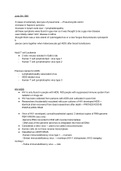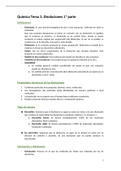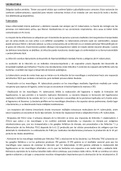Property law assignments
WEEK 1
Please always justify your answer. Also, please refer to, and apply, applicable norms
and principles.
Questions:
1. What are the characteristics of property rights as opposed to personal rights?
-personal rights = can be only enforced against a specific person
right against a person
juridical relation between two or more specific persons
relative
-property rights = have an absolute effect, can be enforced against everybody
Right in a thing
Juridical relation between a person and a thing
Absolute –>enforceable in principle against everybody
Priority principle = older property rights prevails!
2. What is the purpose of property (rights)?
-to be able to do everything I want with the item I have at dispose, to prevent
other people from interfering with my property
-crucial for proper functioning of economy
-property rights regulate relations between persons and things (tangibles and
intangibles)
Property rights allocate scarce goods
Property law regulated in essence:
, –>which property rights are recognized
–>The content of those recognized property rights
–>How one is able to acquire or abandon property rights
–>How a property right can be transferred
–>How a limited right can be created
3. What is the difference between movable and immovable property? What is the
purpose of this distinction?
-movable property= transferable - like a pen
-movable property rights are rights in movable things such as a book or a car
-immovable = cannot be transferred, house, land
-immovable property rights are rights in Land
-what is the purpose? –> because the rules may vary on certain points - with
immovables you have to register the transfer in a Land register there are
more formalities than for the transfer of a movable thing
-principle of publicity
-
4. Book VIII DCFR is about ownership. What is ownership? Is there a different
notion of ownership in common law jurisdictions?
-it’s the most absolute right one can have over a thing. It gives me the right to
do everything I want with the item - to modify it, destroy it. Also cannot use
the item I have the ownership over in a way that is prohibited by law
-the definition of ownership in common law has a more relative approach - it
is not necessary to prove ownership - it is the most absolute right, can be
enforced against everyone except the real owner -> VIII.1:202: definition of
ownership
In civil law systems protected by the rei vindicatio –>if u steal my bike I can
claim it back
In common law systems ownership is protected by the law of torts
-also no definition of ownership in common law systems, because there is no
civil code, common law is mostly based on case law/judge-made law
, -VIII.1:202: definition of ownership
5. What is the difference between ownership and possession in civil law
jurisdictions?
-ownership = absolute right, legitimate claim to an object
-It is a Right over a thing, property rights
-Most absolute right one may have over a thing
-possession (dutch law)= physical control of an object, having sth in
possession does not mean I own it
-physical control over a thing
- has more elements: it requires physical control over a thing
-with a true or false pretention of ownership
-Direct indirect
Possessor pretends that he is the owner
Usually owner is also the possessor
In German law: you possess the thing if you borrow it
Dutch law: even you borrow sth, you don’t pretend to be the owner so you
don’t have possession
it would have to be a theft - A steals B’s laptop and pretends that he is
the owner now
if transfer of ownership has failed - A sells car to B, now has it, but the
transfer of property has not happened for some reason
-Relevance of possession:
can play a role in the transfer of ownership
ownership is only transferred if the good has been delivered
the possessor can under certain conditions, obtain ownership
by acquisitive prescription
the position of the possession is in some respects protected
, BOOK VIII: CH 6
6. What does the numerus clausus principle say? What is the purpose of this
principle?
-It is a closed list of property rights one can have to a thing
-there is a restriction that it is not up to the contracting parties to create new
forms of property right
-number and content of property rights is limited
-the available property rights are limited by law
Parties are only able to create property rights which are recognised by the
law (usually the civil code) Typenzwang
Content of those property rights is limited by law–>the possible content of a
property right is fixed by law, a property right should remain within the
boundaries of the chosen property right. Typenfixierung
Purpose: Legal certainty and predictability
Examples of proprietary rights
-examples of proprietary rights under Dutch law:
Ownership
Limited rights (differ per movables and immovables)
–> Limited right example: Pete is the owner of.
His car, while the bank has at the same time - a
pledge in the car
Limited rights in Movables/intangibles
–>right of usufruct (right to use and become
the owner of the fruit )
–>pledge (security right)
Limited rights in Land (immovables)
(owner of the land is the owner of the building)
Right of usufruct
WEEK 1
Please always justify your answer. Also, please refer to, and apply, applicable norms
and principles.
Questions:
1. What are the characteristics of property rights as opposed to personal rights?
-personal rights = can be only enforced against a specific person
right against a person
juridical relation between two or more specific persons
relative
-property rights = have an absolute effect, can be enforced against everybody
Right in a thing
Juridical relation between a person and a thing
Absolute –>enforceable in principle against everybody
Priority principle = older property rights prevails!
2. What is the purpose of property (rights)?
-to be able to do everything I want with the item I have at dispose, to prevent
other people from interfering with my property
-crucial for proper functioning of economy
-property rights regulate relations between persons and things (tangibles and
intangibles)
Property rights allocate scarce goods
Property law regulated in essence:
, –>which property rights are recognized
–>The content of those recognized property rights
–>How one is able to acquire or abandon property rights
–>How a property right can be transferred
–>How a limited right can be created
3. What is the difference between movable and immovable property? What is the
purpose of this distinction?
-movable property= transferable - like a pen
-movable property rights are rights in movable things such as a book or a car
-immovable = cannot be transferred, house, land
-immovable property rights are rights in Land
-what is the purpose? –> because the rules may vary on certain points - with
immovables you have to register the transfer in a Land register there are
more formalities than for the transfer of a movable thing
-principle of publicity
-
4. Book VIII DCFR is about ownership. What is ownership? Is there a different
notion of ownership in common law jurisdictions?
-it’s the most absolute right one can have over a thing. It gives me the right to
do everything I want with the item - to modify it, destroy it. Also cannot use
the item I have the ownership over in a way that is prohibited by law
-the definition of ownership in common law has a more relative approach - it
is not necessary to prove ownership - it is the most absolute right, can be
enforced against everyone except the real owner -> VIII.1:202: definition of
ownership
In civil law systems protected by the rei vindicatio –>if u steal my bike I can
claim it back
In common law systems ownership is protected by the law of torts
-also no definition of ownership in common law systems, because there is no
civil code, common law is mostly based on case law/judge-made law
, -VIII.1:202: definition of ownership
5. What is the difference between ownership and possession in civil law
jurisdictions?
-ownership = absolute right, legitimate claim to an object
-It is a Right over a thing, property rights
-Most absolute right one may have over a thing
-possession (dutch law)= physical control of an object, having sth in
possession does not mean I own it
-physical control over a thing
- has more elements: it requires physical control over a thing
-with a true or false pretention of ownership
-Direct indirect
Possessor pretends that he is the owner
Usually owner is also the possessor
In German law: you possess the thing if you borrow it
Dutch law: even you borrow sth, you don’t pretend to be the owner so you
don’t have possession
it would have to be a theft - A steals B’s laptop and pretends that he is
the owner now
if transfer of ownership has failed - A sells car to B, now has it, but the
transfer of property has not happened for some reason
-Relevance of possession:
can play a role in the transfer of ownership
ownership is only transferred if the good has been delivered
the possessor can under certain conditions, obtain ownership
by acquisitive prescription
the position of the possession is in some respects protected
, BOOK VIII: CH 6
6. What does the numerus clausus principle say? What is the purpose of this
principle?
-It is a closed list of property rights one can have to a thing
-there is a restriction that it is not up to the contracting parties to create new
forms of property right
-number and content of property rights is limited
-the available property rights are limited by law
Parties are only able to create property rights which are recognised by the
law (usually the civil code) Typenzwang
Content of those property rights is limited by law–>the possible content of a
property right is fixed by law, a property right should remain within the
boundaries of the chosen property right. Typenfixierung
Purpose: Legal certainty and predictability
Examples of proprietary rights
-examples of proprietary rights under Dutch law:
Ownership
Limited rights (differ per movables and immovables)
–> Limited right example: Pete is the owner of.
His car, while the bank has at the same time - a
pledge in the car
Limited rights in Movables/intangibles
–>right of usufruct (right to use and become
the owner of the fruit )
–>pledge (security right)
Limited rights in Land (immovables)
(owner of the land is the owner of the building)
Right of usufruct











